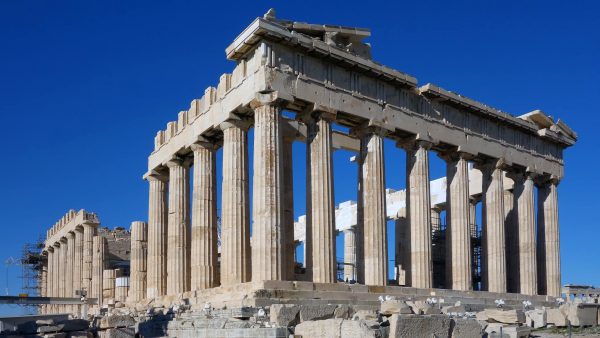214 total views
Homily for Wed of the 6th Wk of Easter, 17 May 2023, Jn 16,12-15

If you have been to Greece, you would know the place that Paul is talking about in our first reading. St. Luke tells us about a specific place in Athens that he visited, and which is still being visited by many tourists up until now—the so-called ACROPOLIS. The name Acropolis literally means the PEAK OF THE CITY, or the hilltop from which you can get a amazing view the rest of the city of Athens. The most famous structure on that hilltop is the Parthenon, that majestic structure surrounded by gigantic pillars. In some other Greek temples the pillars are actually marble sculptures of the Greek gods and goddesses. Most of these are still standing up until this day.
On the northwest section of the Acropolis in Athens is the Areopagus, the ancient Court of Justice where the philosopher Socrates was once tried, found guilty and sentenced to death several centuries before Paul set foot on it. St. Luke tells us in our first reading that Paul delivered a speech there addressed to the elders of the city, and began by expressing his admiration for the religiosity of the people of Athens. He mentions that what particularly caught his attention in all the temples that he had visited was the fact that among the many images of the gods and goddesses that they worshipped, there was always one empty niche. And on the altar in front of that empty niche was the inscription TO THE UNKNOWN GOD.
In Pinoy lingo, Paul would have called them “sigurista” for this symbolic gesture of making sure that they did not overlook a single deity, lest this deity might get offended for being ignored. Paul uses this as his point of departure for speaking about “the God who made the world and all that is in it, the Lord of heaven and earth.” Listen to how he describes this God. He says, this God “does not dwell in sanctuaries made by human hands, no is he served by human hands because he needs anything. Rather, it is he who gives to everyone life and breath and everything.”
This part reminds me of that story in the Book of Daniel chapter 14, where the prophet is confronted by the King for refusing to worship the image of Bel, the Babylonian god. In answer to the king, Daniel said, “Sir, I do not worship idols made with hands, but only the living God who made heaven and earth and has dominion over all flesh.” (We did not make him; he was the one who made us!)
The story in Daniel tells us when the king heard this, he was infuriated and insisted that his God Bel was a living god, because every day, all the Babylonian priests offered sacrifices to him—of meat, grains, olive oil, and that all of it also disappeared on the same day because his living god ate it all. To cut the long story short, Daniel, in the end, proved to the king that he was being fooled by the priests. That they were the ones who had everything to gain by propagating this idea of a hungry god who needed to be served and fed and offered all kinds of sacrifice. He would lead the king to discover how these priests had actually made a secret passage behind the altar, through which their wives and children sneaked at night to steal all the offerings. (See Daniel 14.)
The point of that story is basically the same point that Paul is driving at in his speech at the Areopagus. I think it is also what he meant when he called on the people of Athens to undergo a “METANOIA”. Too bad we tend to lose the real sense of this word by translating it to “REPENTANCE” or “TURNING AWAY FROM SIN”. No, Paul is telling the intelligent people of Athens that if they were truly intelligent, they should REORIENT themselves from the gods whom they had created in their own image, to the God who created them in His image, the God formerly unknown to them but now has made himself known to them through Jesus Christ.
He was telling them to reorient themselves from the primitive concept of a fearful and whimsical God who has to be fed all the time with sacrificial offerings, the concept of a punishing God who gets angry when he gets hungry. The prophet Daniel had proven that the Babylonian priests were the inventors of false gods because they were scammers—they were really the ones who hungered for sacirifices and took advantage of the people’s naive religiosity.
This is also what Jesus is saying in the Gospel when he tells his disciples that there was so much more that he wanted to tell them. But he just had to accept that he could not get them to understand it all at one time. That he was therefore sending them the Holy Spirit precisely because it would take them a much longer time and process to know the truth. Here is his assurance, “When the Spirit of truth comes, he will guide you to all truth.” He knows he has to work double time because the devil, the prince of lies is also just as busy misleading people through the modern-day propagators of idols and fake gods, especially in the social media.
You see, it’s been two thousand years now and the Spirit is still busy guiding us patiently to the truth of the unknown God.


















